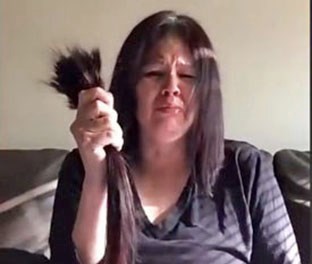“I want justice for me and my sister and this is what I have to offer,” said Odelia Quewezance as she held up hair she had cut while professing her innocence.
“Give me my freedom. I want my freedom. Let me go home.
“I’m innocent. My sister is innocent.”
Sisters Odelia and Nerissa Quewezance were sentenced to life in prison after being convicted of second-degree murder in 1994 for the death of 70-year-old Anthony Joseph Dolff in Kamsack, Sask.
Odelia is currently in a federal healing lodge and Nerissa is in custody on B.C.’s lower mainland. Nerissa wasn’t able to attend the Zoom conference Friday but sent a text message statement through wrongfully convicted advocate David Milgaard.
“I am tired and want the nightmare to end,” said Nerissa.
David Milgaard - who spent almost 23 years in prison after he was wrongfully convicted in 1970 of raping and murdering Saskatoon nurse Gail Miller - called on Saskatchewan Justice Minister Gord Wyant and Canada’s Justice Minister David Lemitti to do the right thing and immediately release the Quewezance sisters.
“You are holding Odelia and Nerissa - two indigenous women – hostage,” said Milgaard Friday during the live-streaming event Free Odelia & Nerissa Quewezance - A Nation Wide Plea.
“Canadians will not stand for this,” added Milgaard. “You have a confession on national television (APTN). This is not justice; this is just wrong.”
Ron Dalton, co-president of Innocence Canada, which started in 1993 and has helped exonerate more than a dozen wrongfully convicted people, said Canadians recognize that the courts don’t always get it right.
Dalton – a bank manager - was wrongfully convicted of killing his wife Brenda Dalton in 1989 in Newfoundland. Brenda choked on food and was taken to the hospital and intubated in the emergency room but later died. In 2000 Dalton was acquitted after a retrial.
Dalton said the government should at least release the sisters while their convictions are sorted out.
“Let them go home to their families.
“We are only asking for justice,” he said.
Toronto lawyer James Lockyer – who has taken on the sisters’ case - said it’s not easy to set aside a guilty conviction. The legal remedy involves going through the federal Justice Minister and Saskatchewan’s attorney general.
Lockyer said his application on the sisters’ behalf should be submitted to the government by October.
“We should have them free to some extent in the New Year.”
Lockyer said it’s important to get Saskatchewan’s attorney general on their side to help convince the federal minister.
In addition, he said the parole board must be pressured to release Odelia and Nerissa.
Kim Beaudin, vice-chief for Congress of Aboriginal Peoples, said he will reach out to the parole board and advocate for the sisters’ immediate release.
Beaudin said Indigenous people typically don’t apply for parole.
“They believe they will be denied and there’s no point.”
Racism in Saskatchewan helped convict the sisters: Advocates
Nicole Porter, advocate for Indigenous Rights and wrongfully convicted said Saskatchewan’s racist system rushed for a conviction in the 90’s. She said the sisters were Indigenous and rural Saskatchewan racism was against them.
“These girls were downright mistreated by our system. During the police interrogation and even after their sentencing, being Indigenous was a factor held against them.”
Porter said the mistreatment started from day one.
A justice of the peace had issued remand warrants ordering that the sisters be remanded to Pine Grove Correctional Centre for women but instead they were held for five days by Saskatchewan RCMP and interrogated.
Porter said no recordings of those interrogations were saved and the interrogations went against the remand warrant.
“Authorities at the time directly disobeyed and continued to interrogate them.”
Porter said there is no physical evidence against the sisters and pointed out that during their trial in the 90’s, the jury didn’t include one Indigenous person.
“Because of the systemic racism, they were out for a pound of flesh and they got their conviction.”
Porter said when Nerissa was first sent to prison she was sent to Saskatchewan Penitentiary maximum-security prison for men.
“She was forced to share living quarters with men,” said Porter. “That boggles my mind and angers me. I can only imagine the horrors she faced and the other young Indigenous women who were thrown into a situation that that.”
The sisters' cousin, who was 14 at the time, has confessed on APTN that he is the one who committed the murder. He was only sentenced to four years in prison and the sisters were given life.
Now, years later, the sisters’ case still hasn’t been reviewed, said Porter.
“Why they have not reviewed their case officially is beyond me. It is time they go home. This is a gross miscarriage of justice.
“We are looking at a system that is stacked against our people. We are asking the prime minister and justice Lametti’s office to intervene,” said Porter. “Enough is enough.”
Likewise Beaudin agreed.
“Saskatchewan is the Alabama of the north. It’s a nickname this province has earned. We should not have earned that nick name.”
Not a justice system
Beaudin said the justice system is just a system and not just.
“It’s not made for Indigenous people at all.”
Likewise Senator Kim Pate said she refused to call it a justice system, adding that the legal system is racist and misogynist.
“I don’t call it a justice system.”
Pate said broader systemic changes must be made and more focus put on wrongfully convicted women. She said because of women’s nature they often blame themselves for things they should have done to prevent something from happening.
“It’s called hyper-responsibility.”
Pate said there needs to be a review of Indigenous women in prison. She said she is aware of 12 Indigenous women serving life sentences who shouldn’t be.
“Nerissa and Odelia are two of them.”





